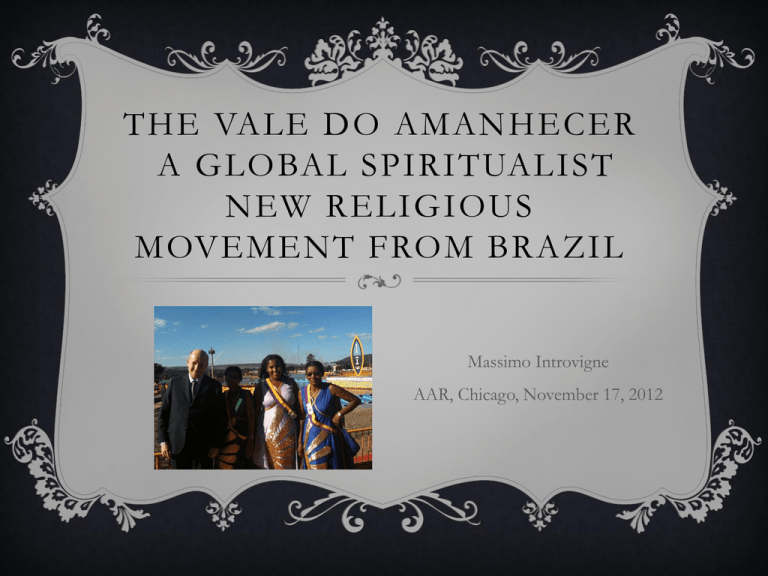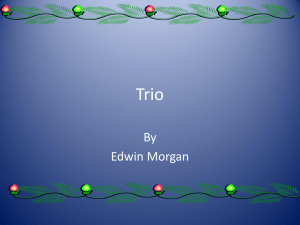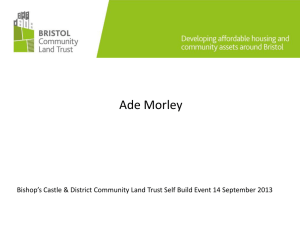The Vale do Amanhecer A Global Spiritualist New
advertisement

THE VALE DO AMANHECER A GLOBAL SPIRITUALIST NEW RELIGIOUS MOVEMENT FROM BRAZIL Massimo Introvigne AAR, Chicago, November 17, 2012 Va l e d o A m a n h e c e r ( Va l l e y o f D a w n ) , i s a n i n c o r p o r a t e d township located four miles near Planaltina, one of the satellite towns of the Brazilian capital Brasilia T H E C H R I S T I A N S P I R I T UA L I S T O R D E R ( O R D E M E S P I R I T UA L I S T A C R I S T Ã , O E C ) The Vale is the headquarters of the largest Brazilian new religious movement, the Ordem Espiritualista Cristã (OEC, Christian Spiritualist Order), which currently claims some 500,000 members 150, 000 B ra z ilia n m em b ers live in t h e Fed era l D is t rict , a n d t h e Va l e h a s a p o p u l a t i o n o f 2 0 , 0 0 0 , a l t h o u g h i t n o w also hosts Catholic and Pentecostal families In Planaltina I counted some 30 Pentecostal houses of worship and was told that Pentecostals now outnumber Catholics in terms of Sunday practice N E I VA C H AV E S Z E L AYA ( T I A N E I VA , 1 9 2 5 - 1 9 8 5 ) 1925 Born in Propriá (Sergipe) 1955 A widow with four sons, becomes the first Brazilian woman truck driver 1956 Moves to Brasilia 1958 First visions of spirits (as a pious Catholic, she rejects them) UNIÃO ESPIRITUALISTA SETA BRANCA (1959-1964) 1959 Neiva meets Spiritualist medium Dona Neném Neném tells Neiva that her messages are from Pai Seta Branca (Father White Arrow), a powerful Native American spirit Neiva and Neném establish in Nucleo Bandeirante, near Brasilia, the União Espiritualista Seta Branca 1960-1964 Communal experiment in the Serra de Ouro TAGUATINGA (1964-1968) 1964: Separation between Neném, who keeps the name União Espiritualista Seta Branca and moves to Goiânia, and Neiva, who incorporates the OEC and establishes a commune in Taguatinga 1965: Neiva meets Mário Sassi (1921-1994), a PR officer for the University of Brasilia and a leader of the Catholic left-wing movement JOC (Catholic Youth Workers). Eventually, Sassi leaves his sociologist wife, five children and his job, and goes to live with Neiva 1968: The OEC loses title to the land in Taguatinga and buys land in what will become the Vale do Amanhecer DEVELOPING THE VALE (1968-1985) Sassi, a city intellectual, becomes the twin leader of the Vale, and elaborates its complex doctrine based on Neiva’s visions. His very effective administrative leadership assures the growth of the Vale community from a few hundred to several thousand members. Sassi focuses on building the Vale as a closed community (without outsiders) rather than on expanding the movement outside the Vale November 15, 1985: Death of Neiva NEIVA’S GRAVE Neiva’s grave is in the cemetery of Planaltina. According to the beliefs of the movement, the discarded body is not particularly important, and – although occasionally visited – the grave is not a central place of pilgrimage THE SASSI SCHISM(1985 -1994) Neiva is succeeded by a three-member directorate including Sassi A conflict emerges between Sassi, who wants to keep the Vale closed to outsiders without incorporating it as a town, and the others, who seek the advantages of incorporation in terms of services provided by the government, even if this means opening the Vale to non-members Sassi leaves and establishes the Universal Order of the Great Initiates. He dies in 1994 without having achieved any significant success. He is still honored in the Vale. GLOBAL EXPANSION (1995 -2012) The incorporation allowed the movement to devote its resources to world expansion Although some predicted the demise of the movement after the death of the founders, the contrary happened: currently there are 680 temples in Brazil, and several thousand abroad, where temples are maintained in Bolivia (3), Uruguay, the United States (Marietta, Georgia), Portugal (2), Germany, Guyana, Trinidad and Japan T h e Va l e t o d a y : a “ n o r m a l ” t o w n o f 2 0 , 0 0 0 , w i t h a small minority of non -members, while members are easily identified by their richly colored dresses SPEARS Many members carry white spears as symbols of Pai Seta Branca (Father White Arrow), which remains at the top of the spirit hierarchy together with Jesus Christ. It is now said to be Saint Francis of Assisi, reincarnated as a warrior cacique along Lake Titicaca. Only Neiva was able to channel Seta Branca THE SPIRITS Four categories of spirits: - Pretos Velhos (African slaves brought to Brazil) - Caboclos (Native Americans) - Spiritual Doctors (Dr. Fritz, Dr. Ralph – mostly German) - Extraterrestrials (from Planet Capela) In addition: Mãe Yara (Seta Branca’s partner, who was St Clare of Assisi) and the Princesses (three runaway slaves and their white savior Janaina) THE GIPSY CONNECTION Most caboclos of the Seta Branca tribe reincarnated twice, first as part of a gypsy tribe and now as members of the OEC. Tia Neiva herself was a leader of that gypsy tribe under the name of Natacha and was at that time initiated by two African slaves, Pai João and Pai Zé Pedro, now leading pretos velhos. Costumes of OEC members largely try to replicate traditional gipsy dresses THE VALE’S TWO CENTERS There are two main religious centers of the township, the temple and the Estrela Candente (Burning Star: not to be confused with “estrela cadente”, i.e. shooting star) complex, located something less than one mile from the temple. The Estrela Candente is the main center for the internal activities of the OEC, while outsiders (called “clients”) seeking cure for physical or spiritual problems are mostly received in the temple. THE ESTRELA CANDENTE The Estrela Candente is an impressive complex, centered on an artificial lake built in the shape of a six-point star with the water of the small river Coatis. Around the lake there are huge carton images of the spiritual entities guiding the movement, crosses and other symbols, portraits of the founders, and several constructions THE ESTRELA’S MAIN RITUAL A sacred “work of disintegration” is performed on behalf of humanity as a whole. Negative energies are disintegrated and imperfect spirits who harass the living are first called, then helped to complete their passage to the higher spheres of the spiritual kingdom ESQUIFES “Esquifes” are 108 large parallelepipeds, each surrounded by a cylinder. Half of these are blue and half yellow. Although their ensemble strangely resembles the modernistic art prevailing in Brasilia, my informants insisted that they are of the utmost importance for first calling and then disintegrating negative energies in the Estrela ritual APARÁS AND DOUTRINADORES The main distinctive feature of the OEC within the larger milieu of Brazilian Spiritualism is the difference between two kinds of mediums, the “aparás” and the “doutrinadores”. The apará is the classic trance medium, who is able to incorporate or channel spirits. The doutrinador does not go into trances, but is able to dialogue with the spirits channeled by the apará and to interpret what the apará - or, rather, the spirits - say. WHO LEADS THE MOVEMENT? Neiva was an apará and this may lead to the assumption that, as in other Spiritualist movements, trance mediums are at the top of the OEC hierarchy. In fact, this is not the case. Aparás are mostly uneducated women, and those middle-class men who have joined the movement are almost all doutrinadores. All top leadership positions are held by doutrinadores. It is also recommended that aparás do not marry another apará but a doutrinador, since in a family emergence of a spontaneous outburst of spirits at least one doutrinador will be needed to control them. THE TEMPLE EXPERIENCE In order to receive the Temple experience, “clients” need a couple of an apará and a doutinador, often a husband and a wife “WORKING” IN THE TEMPLE The temple is divided in three “castles”, the third reserved for serious illnesses only. In the first castle the apará takes into herself the spirit disturbing the client. Then the doutrinador guides the spirit to leave this world and go on toward the realm of light. The client proceeds to the second castle, where the apará channels a higher spirit whose words of advise are interpreted by the doutrinador. Often, the client is told to train as a medium, since everybody is naturally either an apará or a doutrinador. Regular clients often become members. The large majority (even in the Vale) have a job and do not work as mediums full time. THE WIDER CONTEXT The OEC is aware of problems encountered by other NRMs and has strict rules asking mediums to always advise clients to consult also a secular doctor in case of serious illnesses Does not exhibit the anti-Catholicism of other Brazilian NRMs, and insist on the (unsubstantiated) rumor that Pope John Paul II had a sympathy for the movement and received Neiva in secret Is the target of very aggressive campaign by Pentecostals as “demonic” CONFLICT WITH IURD A campaign was started in February 2012 by the leader of the Universal Church of the Kingdom of God (IURD), Edir Macedo, with great fanfare, claiming that the Vale is “full of demons” and should be destroyed But sociologists noted that, paradoxically, some healing/exorcism rituals of IURD are similar to those in the Vale A “UNIQUE” MOVEMENT? The pyramid on the lake, where clients can connect with several entities by putting holy salt on the tip of their tongues, is a familiar feature of many NRMs around the world One example is the Pyramid of Merkiné, near Druskininkai (Lithuania), built on the basis of the visions of Povilas Žėkas – but there are many others While the doctrines of OEC are not “unique”, there is probably no other contemporary movement based on Spiritualism or channeling with such an intense missionary activity and hundreds of thousands of followers throughout the world








